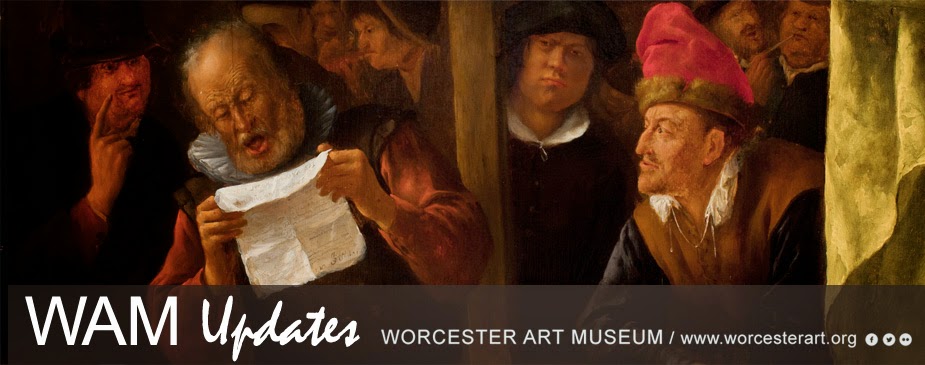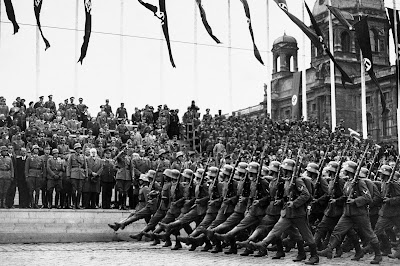Today's WAM Update is part three of a series based on Dr. Richard Neumann's account of his journey escaping Nazi-occupied France in 1943. In the previous sections, he and his wife, Alice, left Paris and crossed France with the help of their guide, "Mr. P." They are now in the unoccupied territory of Vichy France, but the drive towards the Spanish border almost immediately goes wrong.
Dr. Neumann and his art collection are the subject of our ongoing exhibition, "What the Nazis Stole from Richard Neumann (and the Search to get it Back)," on view through January 2022. This narrative is shared with the permission of Dr. Neumann's family.
--
After about 20 minutes, a rather old, not very trustworthy-looking automobile arrived, filled with the baskets of chickens, geese, etc. as well as with our hand luggage. The driver who now took over was unfriendly right from the start, cursing under his breath. It was clear that he undertook this drive very reluctantly.
 |
| German Luftwaffe soldiers at a Paris cafe, 1941 (German Federal Archives) |
After six kilometers, he stopped in a larger town in front of a bakery, and declared that he could not drive any further until he had something to eat. We remained seated in the auto, impatient to hear something from our pilot, and above all, anxious to continue our drive toward our destination. As we were waiting, two local civilians came upon the driver—who was eating—and made angry accusations that he had refused to give them a ride earlier, and now had in fact taken two passengers on board.
At this moment, Mr. P. arrived at the auto […] Both the civilians spoke harshly to him, showing papers identifying themselves as members of the special border police, and asked for his documents. He was able to show that he was a French citizen, and also that his military discharge papers were in order. However, this did not satisfy them and they then also asked for our identification papers, from which they could see right away that we had crossed the border without “laissez-passer” (legal permission). Whereupon they declared us under arrest and I had to follow them to the Police Station, while my wife was allowed to stay with the automobile and our possessions.
Once at the police station, both of the Inspectors told me “…you will be turned over to the German Authorities…” I became very much afraid. All my protestations, that I was a Czech citizen, 62 years old, and had sufficient funds for my subsistence, were useless.
 |
| German soldiers and prisoners, July 1944 (German Federal Archive) |
[…] I was taken back to the automobile, and my wife gave me 18,000 French francs, which I showed them. In her great fright, as I was led back to the police station, my wife took the money out of the briefcase and placed it in the travel-bag of Mr. P., without having the opportunity to tell him that she was doing so. Shortly thereafter, she was also taken to the police station and advised of what lay before her, e.g. “…being turned over to the German authorities, etc.” My wife, who had until now showed herself remarkably courageous and able, burst into tears.
All seemed to no avail and made absolutely no impression on the supervising policeman. We were officially processed, asked about a lot of irrelevant matters, and the writing of a long complaint was begun. I continually protested that we had been in an untenable and dangerous situation and as Czech citizens were deserving of special consideration. One of the policemen present seemed to not totally ignore my arguments, and tried to find among the various regulations a paragraph which might help us.
We were sitting on a light wooden bench without a back support, and as I rose in order to show the Police inspector my passport, the bench tipped over and my wife fell to the ground. This, as well as our totally distraught appearance, seemed finally to awaken some small amount of pity.
[After about 7 hours in custody, the police decided that in view of the facts Neumann argued above, the police decided to submit the case to a French tribunal, who would determine if they should be delivered to German authorities or permitted to leave. It was now about 5pm.]
[…] After this decision about our future, we […] were given permission to look around for private quarters, with the obligation to present ourselves at the police station twice daily, and to not leave the vicinity.
Thereupon we went with the friendly police inspector on a search for a place to stay […] No room was to be found in the entire town and after a very long search the police inspector finally declared that he was not responsible for finding a room for us, and that, if we were unable to find a place, he would simply take us to jail. At this last moment, my wife addressed a woman who had been leaning out of her window and who appeared to be somewhat sympathetic, and asked if there was not anywhere that she could find a room for us. The woman softened, and while declaring that she had neither room nor bed available […] she could let us spend the night sitting on two chairs. We were glad even with this result, and advised the Police Station accordingly.
[They also found that during their time at the station, the automobile, their luggage, Mr. P. and the woman who had helped him had all boarded a train for the Neumanns’ intended destination in B. Mr. P. promised to return in the morning with news of their luggage and money.]
 |
| Undated photograph of Richard and Alice Neumann, taken in France |
We were dead tired and hungry, but there was little to eat…a piece of cheese and a little bread was the substance of our dinner…and we then took possession of our night’s lodging on the two chairs in the kitchen of the good Frenchwoman, where it was at least somewhat dry and warm. Despite the frequent, and not altogether quiet passage of the other guests past our room, we fell asleep surprisingly quickly, tired and stressed as we were, and passed the night.
There could be no thought of washing, or other forms of toilet, and our appearance, covered as we were with layers of mud and dirt, wet and bedraggled gave no hint that we might be persons of culture and refinement.
--
For the moment, the Neumanns were safe--but still before them still lay the tribunal, and the crossing into Spain. In addition, due to pressure from Germany, it was becoming increasingly difficult for "non-Aryans" to book passage on ships out of Europe. Learn the resolution of these difficulties in the final installment of this WAM Update series.
(German Federal Archive photographs licensed under the Creative Commons Attribution-Share Alike 3.0 Germany license.)
Bundesarchiv, Bild 101I-247-0775-38 / Langhaus / CC-BY-SA 3.0
Bundesarchiv, Bild 183-J27289 / Koll / CC-BY-SA 3.0











